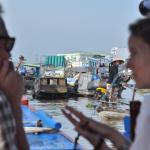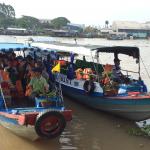


Flux Navigations: Bio-Politics and Urban Aesthetics in the Contemporary Southeast Asian City (ARCH 6308, ASIAN 6682, SHUM 6308)
Thursdays, 2:30–4:25 pm
Course Instructors: Jeremy Foster (architecture) and Arnika Fuhrmann (Asian studies)
This course critically addresses accounts of Southeast Asia's port and delta metropolises as sites of economic and cultural transformation as part of recent power shifts in the region. It focuses on the socio-spatial problematics associated with collision between old and new forms of labor, capital, and governance in urban environments where the impacts of climate change are increasingly evident. The seminar will theoretically complement, and be pedagogically linked to, a parallel Expanded Practice Graduate Design Studio in Architecture whose goal is to explore meta-issues in global urbanism that challenge conventional modes of design practice.
To unpack the modes of sovereignty and personhood emerging in these globalized cityscapes, the seminar juxtaposes notions of bio-power (different forms of governmentality affecting both individual bodies and the social body) with notions of socio-nature (a hybrid of ‘nature,’ the cultural and the practiced). Socio-natures permeate cityscapes at multiple scales, but are especially present in their terrains vagues, peripheries, and interstices where the bio-power associated with conventional urban development weakens. They operate within as well as beyond the frameworks of Western historicism and capitalist modernity; their affective power can never be completely separated from indigenous ecologies and cosmologies, or the tendency for the innately undecidable rhythms of the bio-physical realm to serve as ‘alternatives to the present.’ This is heightened by the temporal logics and agencies at work amongst im/mobilized populations that seldom figure in official maps and records, but show up in the tactical ways urban actors engage the materialities of the cityscape to ‘make space’ for themselves. This shifts geo-aesthetic ‘meaning’ away from historicist notions of belonging and symbolic representation, to more hermeneutic significations played out in terms of temporality, performativity, and spectrality.
Flux Navigations will draw on the new cinemas of the region to speculate about the ghostly as well as political and aesthetic effects engendered by emergent practices and interstitial spaces in these tropical cities. The seminar will draw on literature in visual culture, cinema studies, and transnational Asian imaginaries, as well as urban studies and cultural geography, to understand how human/nonhuman relations are (or are not) being reconfigured by contemporary fluxes and unsettlings. In addition to participating in weekly discussions of readings and film screenings, students will develop a term project that brings the seminar’s theoretical and analytical tools to bear on a bio-social condition in one of the cities under investigation, using a combination of research and in situ observation. Articulation of seminar and studio will occur through strategically timed joint discussions and critiques, and a funded, week-long travel program to Southeast Asia in late September, during which students will get to experience some of the urban settings under investigation, and meet with a variety of local informants and cultural producers.
The seminar is open to selected students in a range of humanities and design disciplines. Due to the interdisciplinary nature of the Mellon Expanded Practice seminars, a wide range of skills and backgrounds are welcome. Advanced undergraduate students may apply, but preference will be given to students in their first three years of graduate study.